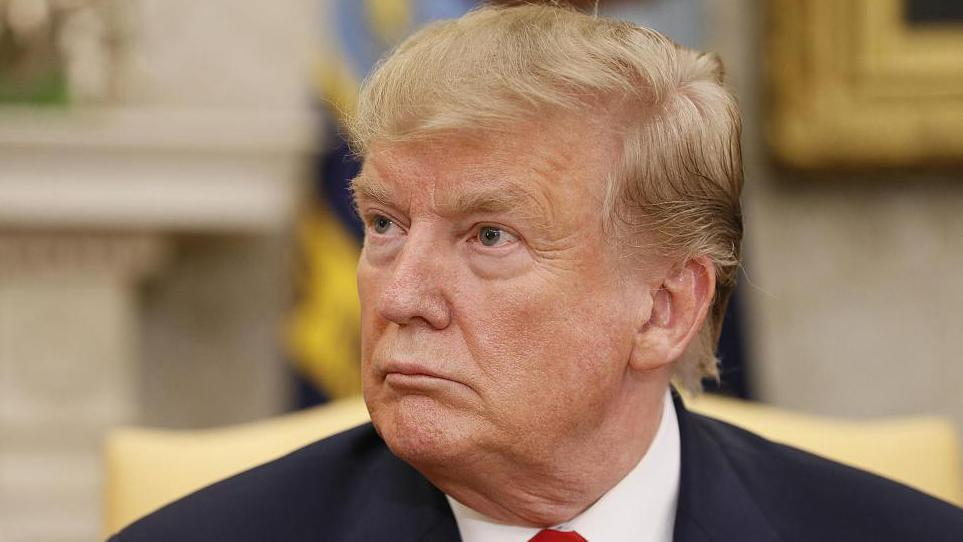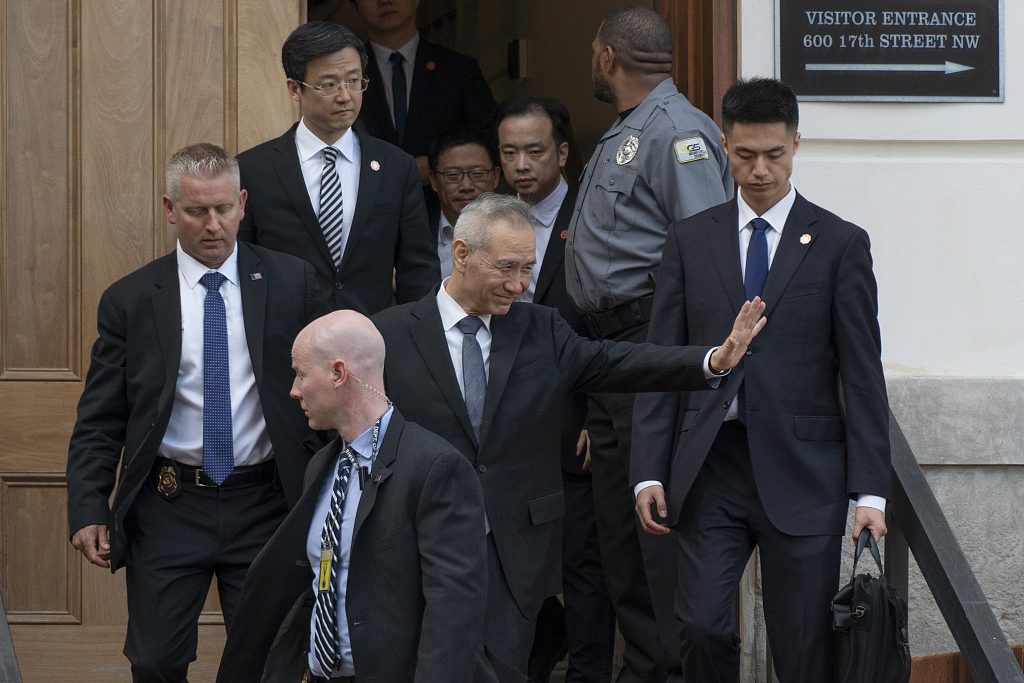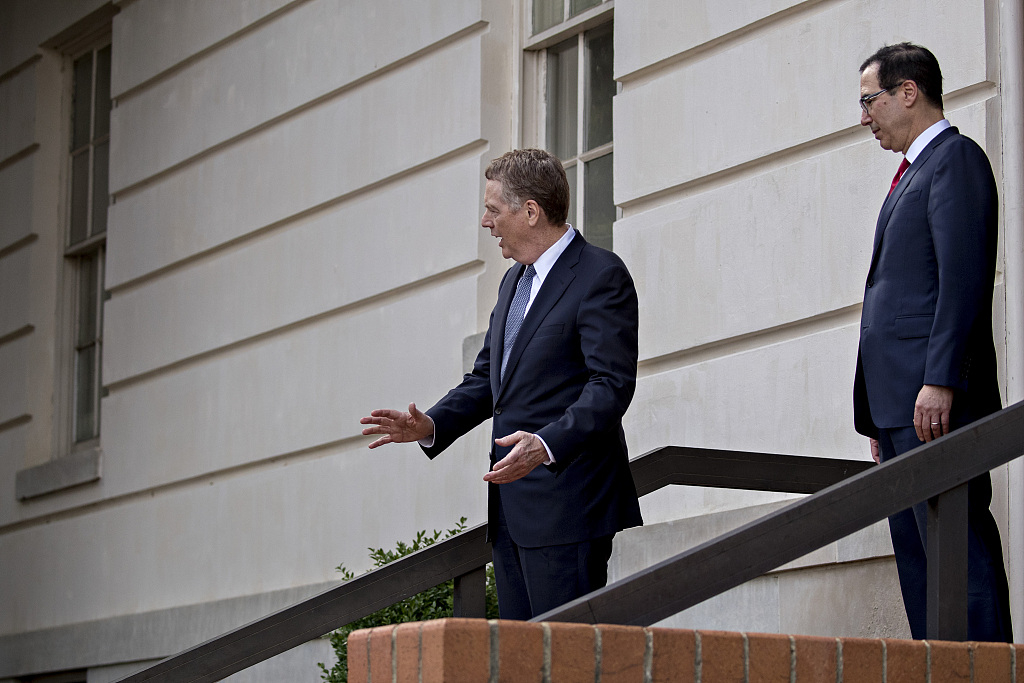
Opinion
09:17, 13-May-2019
China won't capitulate to Trump's bar-room economics
Bobby Naderi

Editor's note: Bobby Naderi is a journalist, current affairs commentator, documentary filmmaker and member of the Writers' Guild of Great Britain. The article reflects the author's opinion, and not necessarily the views of CGTN.
U.S. President Donald Trump's tariffs won't move heaven or earth, and they won't deal long-term results either. History shows China will not cry uncle and capitulate to his trade fight and bar-room economics.
Without providing any reliable basis or even a clear explanation of what's happening, Trump boasts on the success of his brinkmanship to jack up tariffs to 25 percent on Chinese imports worth 200 billion U.S. dollars. He falsely claims his tariffs are helping Americans, caught in the crossfire of a long-drawn-out, destructive trade fight, even as China's Vice Premier Liu He visited Washington for talks on May 10.
We have seen more reality in a novel. The truth is by weaponizing the dollar in the form of tariffs and a renewed trade fight he has only dug up a big hole for American consumers and companies, including farmers. He has also wreaked havoc in the global economy, triggering financial market volatility, the implications of which could be long-lasting and broad-based.

Liu He, China's vice premier, departs the Office of the U.S. Trade Representative in Washington, D.C., U.S., May 9, 2019. /VCG Photo
Liu He, China's vice premier, departs the Office of the U.S. Trade Representative in Washington, D.C., U.S., May 9, 2019. /VCG Photo
The Trade Partnership and the National Retail Federation have sounded the alarms. They warn that the new levies paid by American consumers and companies – not China – would cost an average family of four 767 U.S. dollars per year. They forecast that "the tariffs would cut U.S. employment by 934,000 people and subtract roughly 0.4 percentage points from U.S. GDP."
China says it "deeply regrets" Trump's decision to ratchet up the tariffs but "will have to take necessary countermeasures." The world's top oilseed buyer could decide to further restrict purchases of U.S. agricultural products or take other steps. The impact of China's retaliatory tariffs levied will be even greater if Trump puts tariffs on all Chinese imports.
For all the appearance, if China follows through with tariff exchanges to keep tensions simmering on this geopolitical chessboard, everybody is going to lose with no way around it. American farmers will suffer greater financial losses, and given an already struggling global economy, no one would be able to purchase their crops.
However, there are still ways of tamping down this catastrophic scenario that has rocked global trade networks. They involve a decision to shift from tariff exchanges to political deal and dialogue. Such deals are not unknown. It is very difficult to arrange, but it can be done – with less brinkmanship, not more.
In a prolonged dispute between the two global trade superpowers, nobody will win, everybody will lose, and Trump will be the biggest loser for writing America's downfall. The question is how he wants to engage. The goal should not be to get the Chinese or the American economies to the ground or blame others but to ultimately get a deal, sort out the trade conflict, and save public faces.

Robert Lighthizer, the U.S. trade representative (left), and Steven Mnuchin, U.S. treasury secretary, wait to greet Liu He, China's vice premier, outside the Office of the U.S. Trade Representative in Washington, D.C., U.S., May 9, 2019. /VCG Photo
Robert Lighthizer, the U.S. trade representative (left), and Steven Mnuchin, U.S. treasury secretary, wait to greet Liu He, China's vice premier, outside the Office of the U.S. Trade Representative in Washington, D.C., U.S., May 9, 2019. /VCG Photo
Global trade networks are watching intently and the two super economic powers shouldn't give up on trade talks. A win-win deal to alleviate global concerns should be the ultimate goal here. It's the only way for the rhetoric to die down. The U.S. should do a combination of imagination. It should have common sense and courage to find a way to manage this rivalry without a trade fight and without imposing new taxes on American companies and consumers.
Here is the consequential question, a question that will have the most impact on everyone: Is Trump going to let the forces of history drive him to destructive rivalry and an open-ended trade war that would be catastrophic for the global economy, or can he summon the imagination and courage to find a way for the U.S. and China to prosper together and create great power relations?
If anyone is listening to the actual words here, a meaningful deal can be reached with China if Trump can come up with ideas outside the box, leave a little light on for more diplomacy, and stop twisting the obvious wrong by employing a complex web of deceit and tough man approach to lure his base into giving him more benefit of the doubt. It's a critical test of his intentions.
Trump and his negotiating associates are pretty much aware that their anti-China rhetoric is superficial and that considerable damage has been done. They need to remove the word "threat" from their vocabulary and accept that they are not that perfect – just as they made the strategic mistake of prolonging the unnecessary trade fight and escalating rivalry – with painful consequences for everyone.
They need to realize that the more they embrace the policy of constructive engagement, the more their Chinese counterparts will gravitate towards them.
(If you want to contribute and have specific expertise, please contact us at opinions@cgtn.com.)

SITEMAP
Copyright © 2018 CGTN. Beijing ICP prepared NO.16065310-3
Copyright © 2018 CGTN. Beijing ICP prepared NO.16065310-3